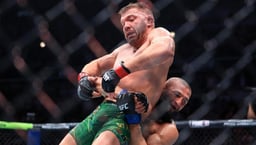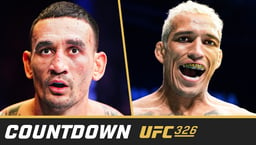
Issue 129
June 2015
Does anybody remember Cain Velasquez? He was UFC heavyweight champion a couple of years ago. Big dude, “BROWN PRIDE” tattoo on his chest and ridiculous cardio for a heavyweight... No?
NICK PEET
The Fighters Only editor laments the current crop of MMA champions’ inactivity
He was awesome. I say was because he’s not been active in the Octagon since October 2013. The heavyweight champion of the world used to be the greatest title in sports. And, let’s face it, mixed martial arts became the new home of the planet’s deadliest athlete when Cain broke through.
With boxing struggling for real crossover stars, Velasquez and his Mexican heritage took MMA’s heavyweight division to the next level. The world knew it: the next generation of great heavyweight champions was destined for the cage rather than the ring.
But after 19 months (and counting) of somber inactivity, that wave of optimism and excitement has well and truly petered out. As far as MMA is concerned, the heavyweight division has flatlined.
Sure, Mark Hunt’s walkaway KOs, Fabricio Werdum’s striking baptism, and aging former Pride champion Cro Crop’s Indian summer has most fans smiling. But nothing piques the casual fan’s interest like when the biggest prize in combat sports is on the line.
Since the last time Velasquez defended his title, the UFC alone has added an entire weight division, women’s strawweight, in which the belt has already changed hands once; Ronda Rousey – then a one-fight UFC novice – became the biggest star in MMA; Anderson Silva was still the reputation-intact GOAT; and both Georges St Pierre and Dominick Cruz were champions.
Incidentally, it was the departure of both GSP and Cruz as champions that led to two of the most exciting divisions in the UFC springing into life. The welterweight division owned 2014 as the belt changed hands twice and 170lb’s leading contenders dazzled on countless fight cards.
The stripping of Cruz as 135lb king led to Renan Barao’s breakthrough as a pound-for-pound star, only for him to be unceremoniously usurped by a TUF runner-up in TJ Dillashaw. His emergence, and that of Robbie Lawler up at welter, were two of the highlights of the year.
It’s bizarre that Zuffa hasn’t put some kind of regulation behind champions and their inactivity – as a result of injury or not. I struggle to understand why a world-title reign shouldn’t be cut short if a champion is unable to defend their belt. After all, what’s everyone below them jostling for position for if the belt owner’s not even contesting it?
Inactivity is a frustrating factor that’s forever been a blight on fight sports. But it’s felt so much more in MMA, where fighters are signed and therefore limited to fighting for only one organization. It’s an issue that’s symptomatic throughout MMA. And not just at heavyweight either.
Chris Weidman’s lack of recent action has poured water on a middleweight division he set on fire by claiming back-to-back wins over Silva. Three defenses in two years is just not enough to keep fans engaged – despite his bizarre, long-running PED/injury furore with Vitor Belfort.
Anthony Pettis looked like he was ready to take on the world when he conquered Benson Henderson, only to spend the next 19 months sitting on a UFC lightweight belt and posing for cereal-box covers. Even Dillashaw, who had the world at his feet when he ousted Barao with one of the best performances in MMA history 12 months ago, has managed just one defense of the bantamweight championship.
Would a 12-month mandatory defense regulation not improve matters? Surely if a champion can’t defend their belt inside a year of winning it and has no fight scheduled, it’s more than fair to encourage them to step aside and allow two leading contenders keep the championship active.
I appreciate it’s undoubtedly a career high to capture a world title belt, especially in one of the world’s leading fight organizations, but it’s simply not fair on fans, rival fighters or even the promoters to capture gold and seemingly head off into the sunset.
Sure, a lot of athletes win the belt and then look to have the surgeries and rectify the long-running issues they’ve battled on their road to the top. But any injury that takes more than a year to rehab should automatically force a belt to be relinquished.
After all, there’s absolutely no reason why a stripped former champion wouldn’t get an immediate title opportunity when they returned. They would have never had the belt taken from them, so it would only be fair to give them the first opportunity to try and take it from the new divisional kingpin.
Stay active or get stripped. It’s a no-brainer for me.










